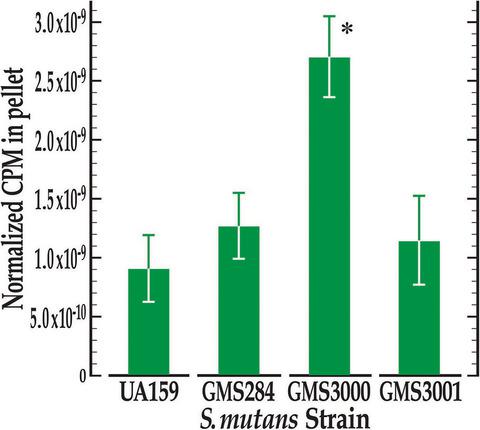当前位置:
X-MOL 学术
›
Mol. Oral Microbiol.
›
论文详情
Our official English website, www.x-mol.net, welcomes your
feedback! (Note: you will need to create a separate account there.)
The S. mutans mntE gene encodes a manganese efflux transporter.
Molecular Oral Microbiology ( IF 2.8 ) Pub Date : 2020-03-31 , DOI: 10.1111/omi.12286 Joseph O'Brien 1 , Alexander Pastora 1 , Andrew Stoner 1 , Grace Spatafora 1
Molecular Oral Microbiology ( IF 2.8 ) Pub Date : 2020-03-31 , DOI: 10.1111/omi.12286 Joseph O'Brien 1 , Alexander Pastora 1 , Andrew Stoner 1 , Grace Spatafora 1
Affiliation

|
Streptococcus mutans is a colonizer of the human dentition, and under conditions of dysbiosis is the primary causative agent of dental caries. The pathogenic potential of S. mutans depends, in part, on its ability to regulate the transport of metal ions across the plasma membrane to maintain intracellular metal ion homeostasis. Research in our laboratory has focused on the Mn2+‐specific SloC lipoprotein importer and its regulator encoded by the S. mutans sloR gene. Herein, we used a bioinformatics approach to identify a gene on the S. mutans UA159 chromosome, SMU_1176, as a metal ion efflux transporter that contributes to S. mutans manganese ion homeostasis. Metal ion sensitivity assays performed with the wild‐type S. mutans UA159 strain and an isogenic SMU_1176 insertion‐deletion mutant, called GMS3000, revealed significantly heightened sensitivity of GMS3000 to MnSO4 challenge. 54Mn uptake experiments support the accumulation of 54Mn in GMS3000 cell pellets when compared to 54Mn concentrations in UA159 or in a complemented strain of GMS3000, called GMS3001. Inductively coupled plasma mass spectrometry (ICP‐MS) studies were performed in parallel to quantify intracellular manganese concentrations in these strains, the results of which corroborate the 54Mn uptake studies, and support the SMU_1176 gene product as a Mn2+ efflux protein. Expression profiling experiments revealed de‐repression of SMU_1176 gene transcription in the SloR‐deficient GMS584 strain of S. mutans, especially under high manganese conditions. In conclusion, the S. mutans SMU_1176 gene, which we renamed mntE, is a manganese efflux transporter that contributes to essential metal ion homeostasis as part of the SloR regulon.
中文翻译:

变形链球菌mntE基因编码锰外排转运蛋白。
变形链球菌是人类牙列的定居者,在营养不良的情况下是龋齿的主要病因。变形链球菌的致病潜力部分取决于其调节金属离子跨质膜运输以维持细胞内金属离子稳态的能力。我们实验室的研究集中在Mn 2+特异性SloC脂蛋白导入物及其由变形链球菌sloR基因编码的调节剂上。在本文中,我们使用生物信息学方法鉴定了变形链球菌UA159染色体上的基因SMU_1176,作为有助于变形链球菌的金属离子外流转运蛋白。锰离子稳态。用野生型变形链球菌UA159菌株和一个同基因SMU_1176插入缺失突变体GMS3000进行的金属离子敏感性测定表明,GMS3000对MnSO 4激发的敏感性大大提高。与UA159或补充的GMS3000菌株GMS3001中的54 Mn浓度相比,54 Mn摄取实验支持GMS3000细胞沉淀中54 Mn的积累。平行进行了电感耦合等离子体质谱(ICP-MS)研究,以量化这些菌株中细胞内锰的浓度,结果证实了54种锰摄取研究,并支持SMU_1176基因产物作为Mn 2+外排蛋白。表达谱分析实验表明,在变形链球菌SloR缺陷型GMS584菌株中,SMU_1176基因转录的表达受到抑制,尤其是在高锰条件下。总之,变形链球菌SMU_1176基因(我们更名为mntE)是锰外排转运蛋白,作为SloR调节剂的一部分,有助于基本的金属离子稳态。
更新日期:2020-03-31
中文翻译:

变形链球菌mntE基因编码锰外排转运蛋白。
变形链球菌是人类牙列的定居者,在营养不良的情况下是龋齿的主要病因。变形链球菌的致病潜力部分取决于其调节金属离子跨质膜运输以维持细胞内金属离子稳态的能力。我们实验室的研究集中在Mn 2+特异性SloC脂蛋白导入物及其由变形链球菌sloR基因编码的调节剂上。在本文中,我们使用生物信息学方法鉴定了变形链球菌UA159染色体上的基因SMU_1176,作为有助于变形链球菌的金属离子外流转运蛋白。锰离子稳态。用野生型变形链球菌UA159菌株和一个同基因SMU_1176插入缺失突变体GMS3000进行的金属离子敏感性测定表明,GMS3000对MnSO 4激发的敏感性大大提高。与UA159或补充的GMS3000菌株GMS3001中的54 Mn浓度相比,54 Mn摄取实验支持GMS3000细胞沉淀中54 Mn的积累。平行进行了电感耦合等离子体质谱(ICP-MS)研究,以量化这些菌株中细胞内锰的浓度,结果证实了54种锰摄取研究,并支持SMU_1176基因产物作为Mn 2+外排蛋白。表达谱分析实验表明,在变形链球菌SloR缺陷型GMS584菌株中,SMU_1176基因转录的表达受到抑制,尤其是在高锰条件下。总之,变形链球菌SMU_1176基因(我们更名为mntE)是锰外排转运蛋白,作为SloR调节剂的一部分,有助于基本的金属离子稳态。











































 京公网安备 11010802027423号
京公网安备 11010802027423号